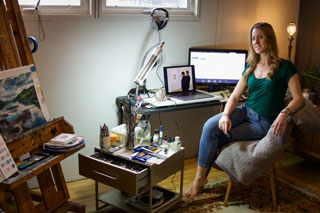Faculty Take Teaching Online
Tech tools help with the transition

Faculty at the University of Pittsburgh at Bradford spent last week preparing to move their courses online Monday for the rest of the spring semester, which ends April 24.
“Not being able to work next to a student is hard,” said Anna Lemnitzer, associate professor of art and director of the art and interdisciplinary arts programs. “It will be a weird transition of not seeing students.”
When the university announced its intention to move classes online to help prevent the spread of COVID-19, the classes most students asked about were the ones that are hands-on, such as art.
But, the faculty are ready. Lemnitzer said she taught her first online course last summer and worked for a year to prepare. She already has students in her digital graphic design and photography classes deliver their assignments to her via Box, a cloud-based storage that the university subscribes to.
From her previous experience teaching online, she said one challenge is to make sure her directions to students are perfectly clear. Another challenge was making sure she had assigned the right amount of work.
She tries to vary assignments and plans to ask students to record some responses in audio or video to keep the human touch.
“The watercolor class will be the hardest,” she said. “I’ll just have to make some watercolor tutorials.”
In the art department, ceramics class was the hardest to move online. Lemnitzer said that as soon as the university announced its plans, adjunct ceramics instructor Anne Mormile came to campus to create materials kits for each student pick up when they returned to campus to move out of their residence halls.
One of the toughest programs to move online was nursing, where second-year students are busy with clinical rotations taught in actual medical settings.
“In-person, hands-on clinical instruction has been suspended for the remainder of the term consistent with university requirements,” said Dr. Tammy Haley, associate professor of nursing and director of the nursing and radiological science programs.
“Students will continue to learn in a virtual clinical environment by using simulations and other alternate learning activities that have been carefully selected by the nursing faculty.”
It is not certain whether radiological science students, who receive instruction from staff at Bradford Regional Medical Center, will be able to and get back to work.
With local schools in recess for at least the next week, the university’s student teachers are in limbo as well. Pennsylvania law requires student teachers to complete at least 12 weeks of teaching before they can be certified, but a law is being introduced that could change that in light of the pandemic.
Other hands-on classes have had to switch things up as well.
In the fall of 2001, Dr. David Soriano, associate professor of chemistry, taught the first online course at Pitt-Bradford, the popular Drugs and Society, which he’s still teaching today using recorded lectures, chapter overviews and summaries, discussion board assignments and interaction, but he’s adding Zoom as a new tool.
“Zoom is excellent,” he said. “I tested it out by interacting with our technology integrator, and it was great.”
Soriano will use Zoom for personal video chat office hours. He also installed a new program that will allow him to draw chemical equations and solutions.
And for labs, Soriano has a backlog of YouTube videos demonstrating chemical reactions that are among the most popular videos on Pitt-Bradford’s YouTube page.
Academic technology integrator Bernie Picklo is optimistic that moving all instruction online for the rest of the semester will be successful for professors and their students.
“We have such a large percentage of our faculty who are already making use of online tools that they’re pros at this stuff,” he said.
That frees him up to work with faculty members who have been teaching strictly face-to-face for decades. One, Picklo said, was the first person in his office once the announcement was made. Picklo worked with that professor to put exams online.
“I am very proud of our faculty,” said Dr. Steve Hardin, vice president and dean of academic affairs. “They all have worked very hard the last couple of weeks to prepare so they could provide the best academic experiences for our students under these challenging circumstances.”
--30--